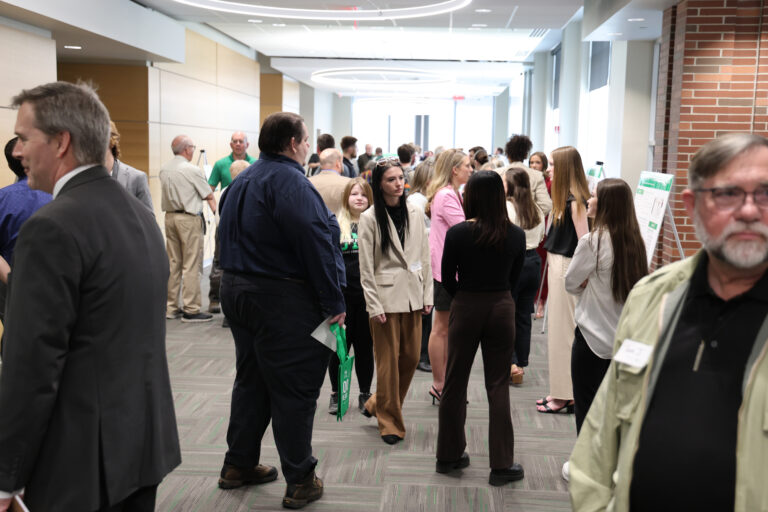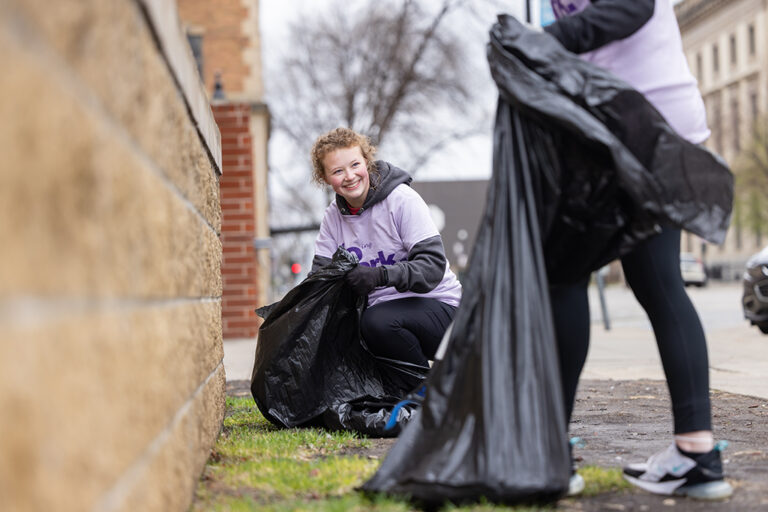Green living for a healthier community
‘Earth Day Fair: Green Eating for a Green Planet’ shows importance of food sustainability, fostering a healthier planet

Imagine walking through a garden on a warm summer day, the sunbaked soil underfoot. While plucking and eating a raspberry straight from the bush, a realization strikes: the whole experience, from the taste of the berry to the warmth of the sun, offers a connection to nature that a grocery store can’t replicate.
This connection was something that Joshua Hunter, an associate professor in the Educational Foundations and Research program who runs GRO.UND with Cheryl Hunter, the interim dean of the College of Education & Human Development, and Erin Lauckner, a clinical instructor in the College of Nursing & Professional Disciplines’ Department of Nutrition & Dietetics who specializes in community nutrition, were keen on sharing with the community at the 2024 Earth Day Fair, which was held on April 22.
Themed “Green Eating for a Green Earth,” the event was held at the Education Building and Archives Coffee House. Its aim was to show attendees the interconnected nature of environmental and personal health.
The Department of Nutrition & Dietetics and the College of Education & Human Development jointly sponsored the event, promising “a celebration of sustainability and delicious, eco-friendly eating topics.”
Nourishing learners and communities
“When we’re outdoors and observing nature and being in tune with natural rhythms, we build a cognitive, emotional and physical connection to our environment,” Hunter said. “We’re able to provide that to the community through the Learning Garden, and it’s extraordinary to watch that process unfold when people come by.”’
Heather Chatham, an educator who works with the local child literacy group GF Little Learners, is familiar with the intersection of nature and learning. She was there to share a new literacy program for young learners: a story walk that will appear in the Learning Garden in June.
The story walk, an interactive literacy experience in which students read a deconstructed story while touring the garden, offers a chance for students to learn and experience nature at the same time.
She said learning about nature’s sights, sounds and smells has proven beneficial for young students. She also mentioned that it would help children and families learn more about the Learning Garden and sustainable practices.
“It’s really empowering to see UND embrace the continuum of learning, from early learning to higher education,” Chatham said. “It makes a difference for younger students in the community to see themselves and their families welcomed to a college campus where they might not have known they were welcome before.”

But Hunter said that it’s not only children who can gain something from learning about the natural world around them.
“We want to showcase how diverse our food and communities are and why that’s important. So, we want to be as inclusive as possible when we’re thinking about these experiences,” Hunter said. “We’re working with places like the Wellness Center and programs like Nutrition & Dietetics to make sure that community members, students and faculty all have potential for these experiences.”
On the bottom floor of the Education Building, Hunter gave attendees tours of the produce being grown in the GRO.UND greenhouse. Basil, tomatoes and clover, among others, are all grown there and in the Learning Garden and shared with the community.
“We donate a lot of the food we grow to local businesses and the UND Food Bank because we’re concerned about food insecurity among the campus community,” Hunter said.
Accordingly, Hunter said that at the core of GRO.UND’s mission is to help the community and the people who live there.
“It all comes down to how we can create a really livable and sustainable environment that helps us to make our social relationships and local economy more resilient, more adaptive and more responsive to change,” Hunter said.

Waste not, the Earth will thank you
Upstairs in the lobby, the atmosphere swelled with the music of Tamara Bertram, a PhD. student in music education and innovation training specialist at the Center for Innovation. She played soothing classical music on her viola. To her right, five nutrition and dietetics students gave presentations on the cycle of food waste, each student focusing on a different aspect of food sustainability. The presentations and activities covered all stages, from buying food to discarding waste.
“Nutritional science can be complicated. People often assume they have to do everything don’t want to make changes because they find it confusing,” the students’ instructor, Erin Lauckner, said. “We’re hoping to show people what they can do to reduce food waste but still bring in those nutritious foods.”
Third-year nutrition student Emma Cullen presented on composting and how leftover produce can be recycled to save time and money. She had an activity set up for participants to organize different kinds of food waste in plastic bins and appreciated the opportunity to talk with the public.
“I think it’s really great for us to be able to share the small ways we can help the environment,” Cullen said.
Similarly, Autumn Thompson, a double major in pre-med biology and dietetics, was presenting on shopping for in-season and local produce. She said the event allowed her to embrace some of her favorite aspects of the program.
“I’ve always loved nutrition, it’s such a fascinating science. It’s so critical for not only our individual health, but our systemic health,” Thompson said.
She continued: “Food brings people together. Something I love about this program is that we’re learning not only about the individual health component but also the community and social components. I think it’s really fascinating.”
Lauckner said she hopes attendees walked away with a similar realization, and that the event offered her and her students the chance to show the community the ways, big and small, they could make a difference for themselves and for the Earth.
“We’re trying to help people see the links between our food system and the environment. It’s so important to make sure that everyone is nourished and that we’re taking care of our environment,” Lauckner said. “Having our nutrition majors present their work is really about sharing with the public the simple steps they can take toward improving their nutrition and sustainability practices.”
The Earth Day Fair was supported by Archives Coffee House, UND Wellness & Health Promotion, UND Landscaping, GF Little Learners, the U.S. Department of Agriculture’s Natural Resources Conservation Service, the Grand Forks County Soil Conservation District, the Blue Zones Project by ShareCare, the North Dakota State University Extension in Grand Forks County and the Town Square Farmer’s Market.




